#leopold and loeb
Text
9 Queer Movies from the 1990s You May Not Have Heard Of
It's New Years, which means it's time for lists. And while everyone else is doing 'top X of 2023,' I've decided to list 9 queer movies from the 1990s. Why? Because I wanna. Plus, in discussions of representation, I often see folks talk about it with a heavy focus on mainstream 'Hollywood' produced movies, which leads folks to talk as though progress has been linear. As if, in the past there was no/'bad' queer representation and now there is 'good' representation. But of course it's not that simple. Plenty of amazing queer movies were produced in the past decades...they were just indie movies and thus difficult to find in a world prior to Netflix and Mubi and whatnot. But now we have streaming services, so allow me to share some of my favorites from the before times (specifically the 1990s).
Without further ado....here is an alphabetical list of queer movies from the 90s you may not have heard of (especially if you're under 30).
--

Beautiful Thing (1996) (dir. Hettie Macdonald)
Before there was Heartstopper, there was Beautiful Thing. It's a story about two gay teens, one sporty and one very much not sporty...and about how they deal with pressure to come out and pressure to hide who they are. It's a very sweet coming of age story, really. However, unlike Heartstopper, in Beautiful Thing the economic class of the protagonists plays an important role in the story (the characters all live on a counsel estate in London). The characters stories are nearly as much about them being working class as it is about the two main character being gay. It's one of the first movies I ever saw about gay teens, and I loved it. I still get a wistful smile every time I hear Mama Cass Elliot's "Make Your Own Kind of Music." (cw for parental abuse)
--

Edward II (1991) (dir. Derek Jarman)
The real Edward II was King of England for 20 years in the 14th century. At the end of the 16th century, Christopher Marlowe wrote a play about Edward's reign and eventual downfall. In 1991, Derek Jarman streamlined Marlowe's play and brought all the homosexual subtext between Edward and Gaveston way out front. In the film, Edward II is in prison and reflects on the events which have led him to that point. The trouble begins when Edward takes the throne and brngs his exiled lover, Gaveston, back to England. All around them the rest of the aristocracy (including Edward's wife) conspire to bring Gaveston down. The movie itself is anachronistic (set in 1991), with minimal sets and costume, and staged a lot like a play. A lot of the dialogue is right out of Marlowe's play, though there are some changes to the story (notably at the end). It's honestly my favorite Derek Jarman movie, and frankly one of my favorite movies, full stop. (cw for blood, animal corpses, violent death)
--
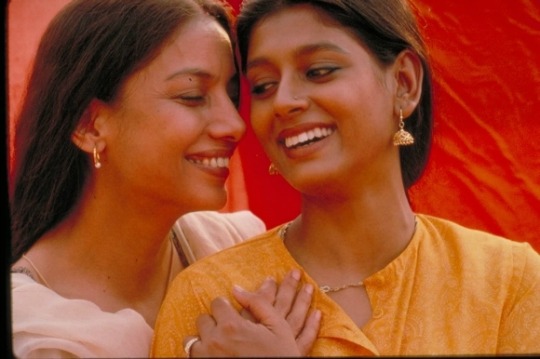
Fire (1996) (dir. Deepa Mehta)
Fire is the first film in the Elements Trilogy written and directed by Deepa Mehta. Each film in the trilogy is about different characters in India, with the connection between the three being thematic rather than plot or character. Fire is about two Indian women, Radha and Sita, who form a bond through their struggles living within a traditional "joint-family" (i.e. a family where all extended family live together and all money and resources are shared). The women in this family have very little agency and this film explores how the two main characters navigate through it. The men in this film are also repressed by the social structure in which they live, and this film spends some time looking at that as well. It's a film about queer desire between women living under patriarchy. (All the movies on this list are available on streaming services in the US, except Fire. However, I was able to find it uploaded to a random YouTube channel) (cw for someone catching on fire, brief domestic violence (a slap), and non-consensual kissing)
--
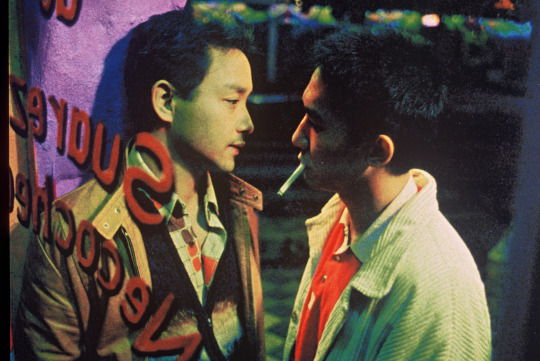
Happy Together (1997) (dir. Wong Kar-wai)
In Happy Together, two men from Hong Kong travel to Argentina and eventually get stuck there when they run out of money and are unable to return home. The relationship between these two men is very tumultuous, with a lot of arguing and breaking up and getting back together. It's one of the first movies I saw in which queer folks have, just, regular ol' relationship drama - exasperated by the regular ol' struggles of life. (i cant remember if there are any content warnings i should put here; it's been a few years since i've seen it)
--
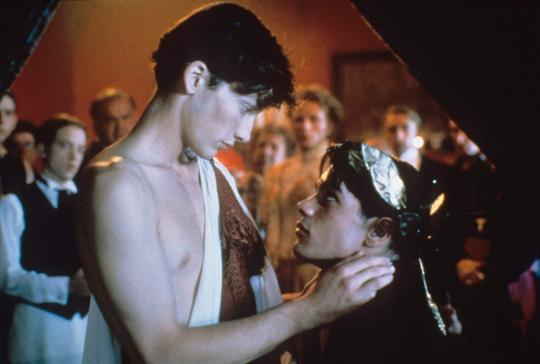
Lilies (1996) (dir. John Greyson)
Lilies is a Canadian film in which a prisoner requests a bishop come to the prison to hear the prisoner's last confession. It quickly becomes clear, however, that the prisoners have something else in mind when they begin staging a play. It turns out the bishop and prisoner knew each other as teens, and the play is about the events in their lives that led up to the prisoner being put on trial. So you end up with a play-within-a-play (or rather a play-within-a-movie). The film weaves between the production staged in the prison and the memory of the events in a really fluid way. All the prisoners portray their characters in the 'memory' sections, which lends itself to some really great moments in the prison sections. And at the heart of this memory/story is a queer love story. (cw for parental abuse, murder, fire, and suicide)
--

The Living End (1992) (dir. Gregg Araki)
This is a film about two young gay men who are diagnosed HIV positive. Unlike more mainstream films about HIV that came before (and after), The Living End wears its anger and pain on its sleeve. The entire world is entirely fucked up, and so these two men turn to a nihilistic outlook. The acting is just okay and some of the dialog is a bit ridiculous...but what draws me to rewatch this movie is the way that it conveys the emotion of the time. It's a ball of rage manifest on film. (cw for attempted suicide, rape, murder)
--
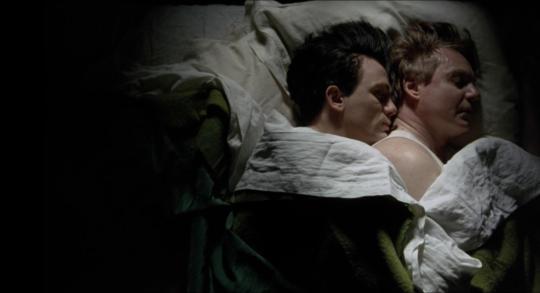
Love is the Devil (1998) (dir. John Maybury)
One of the problems with the average biopic is that it attempts to portray a person's entire life in a single movie. Thankfully, Love is the Devil doesn't have that problem; it focuses on only 8 years of Francis Bacon's life - the time he spent with a man named George Dyer. By this point, Bacon was already an extremely famous artist (and, at least in the film, a bit of an asshole). Bacon meets Dyer as Dyer attempts to burgle Bacon's studio - and thus begins an extremely dysfunctional love affair. If you want to see Derek Jacobi and Daniel Craig portray this dysfunctional relationship, then this is the movie for you. Also, if you want to see a biopic that lets the subject of the film be portrayed as a shitty person, this is a film for you. (cw for bdsm, drug use, untreated mental illness, and suicide)
--

Orlando (1992) (dir. Sally Potter)
From right out the gate, Orlando announces its queer themes by having Quentin Crisp portray Queen Elizabeth I, and Tilda Swinton portray Orlando (a man). From the first scenes it becomes clear that gender is going to be a main theme in the movie. Orlando is a young man who will never grow old and never die. He begins life in the 1500s, during Queen Elizabeth's reign, and we see him (and later, her) throughout the centuries between then and 'present' day (1992). The film is broken into thematic chunks (poetry, politics, society, etc). In each of these chunks we see Orlando's life as it reflects the social norms of the time (especially gender norms).
--
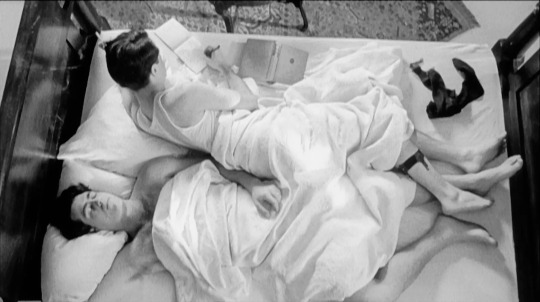
Swoon (1992) (dir. Tom Kalin)
Like Rope (1948) and Compulsion (1959), Swoon is a film about the Leopold and Loeb murder. Unlike the earlier films, Swoon makes the gay relationship between Leopold and Loeb explicit. Their relationship in the film is fairly uneven, with Loeb being characterized as more of an explicit manipulator. Leopold, on the other hand, is driven more by wanting to please Leopold. Complicating this dynamic is the way that Leopold is the one more interested in their sexual relationship. Is Loeb exchanging sex for help with his criminal activities? Or is Leopold committing crimes in order to elicit sex from Loeb? Or both...something a bit more complicated than either/or? The film, especially the latter half, eschews and lampoons the sensationalism of the reporting of the crime from the time. (cw for murder, blood (in black and white), and animal corpses)
--
Honorable mention goes to more well-known movies I didn't put on this list, such as: But I'm a Cheerleader, Velvet Goldmine, Bound, Adventures of Priscilla Queen of the Desert, The Birdcage, To Wong Foo, Thanks for Everything! Julie Newmar, My Own Private Idaho, Bent...there are actually a whole lot of queer movies from the 1990s, now that I think about it.
#beautiful thing#hettie macdonald#edward ii#derek jarman#fire#deepa mehta#happy together#wong kar wai#lilies#john greyson#the living end#gregg araki#love is the devil#john maybury#orlando#sally potter#swoon#tom kalin#virginia wolf#leopold and loeb#tilda swinton#quentin crisp#derek jacobi#daniel craig#francis bacon#lgbt movies#queer movies#lgbt representation#queer representation#1990s movies
40 notes
·
View notes
Text
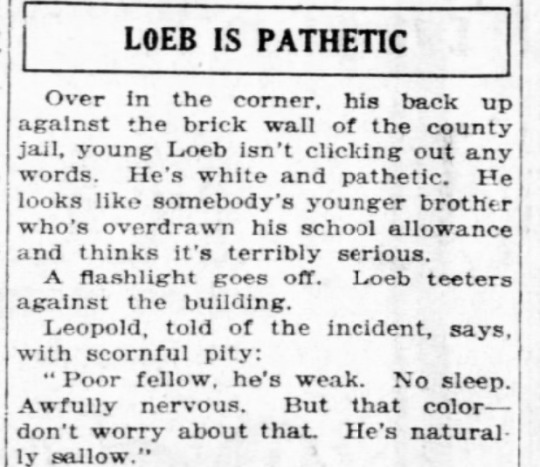
petty beyond pettiness
Chicago Tribune. June 2, 1924.
#leopold and loeb#richard loeb#nathan leopold#old news#chicago tribune#those news reporters were having the time of their lives during this week
27 notes
·
View notes
Text
i've been getting rlly into the Leopold an Loeb case and I know there's like a very small community that talks about it on here but did you guys know you can just read their psych evals??? all like 300 pages ????
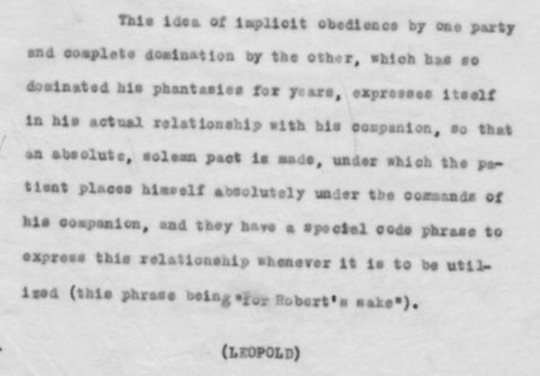



some highlights <3 crazy that theyre more comfortable taking about murder than gay people
#absokuteky insane#I fee like I shouldn't have access to his deepest flaws and desires but hey!!#leopold and loeb#Richard loeb#nathan Leopold#hey this animal can talk
13 notes
·
View notes
Text
a moment of appreciation for Nathan's crooked smile


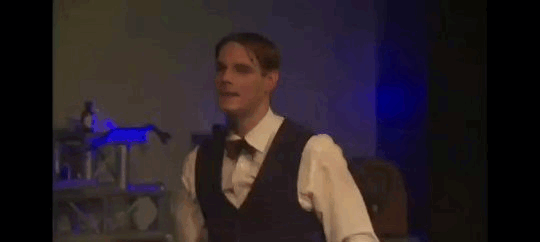

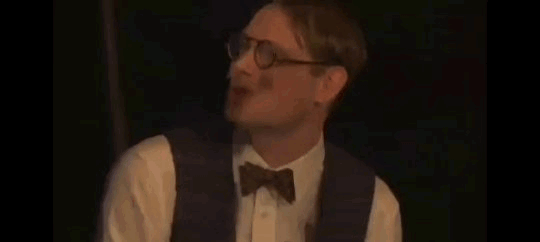
#thrill me musical#leopold and loeb#german musicals#I would die for Fin Holzwart he's something else#stream german production guys
26 notes
·
View notes
Photo

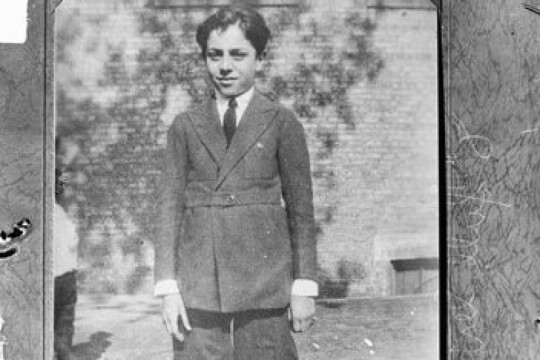
19-year-old Nathan Leopold and 18-year-old Richard Loeb were both law students at the University of Chicago when they decided that they wanted to commit the “perfect crime.”
During the summer of 1924, the two young men rented a car and drove to a local private school where they met 14-year-old Robert Franks and offered him a ride. They had picked this boy due to the fact that he was the son of a wealthy watch manufacturer. The duo had already written a ransom note when they picked the young boy up and it was delivered to his father, Jacob, the following morning.
Before Jacob even had a chance to respond to the ransom note, the body of his son was found in a culvert. Found near his body was a pair of glasses which were traced back to Leopold. They confessed that they had attempted to knock the boy unconscious with a chisel but they had hit him too hard, killing him. Loeb died in prison in 1936 and Leopold was released in 1958.
58 notes
·
View notes
Text
If I had a nickel everytime I was enjoying a work of fiction and then found out it's insipired by Leopold and Loeb, I'd have two nickels. Which isn't a lot but it's weird that it's happened twice.
#why is everything inspired by them#rope 1948#datvd#these violent delights#leopold and loeb#actually im not sure if micah nemerever has said that datvd is inspired by them#but they sure have been compared a lot#and it pretty obviously is
15 notes
·
View notes
Photo
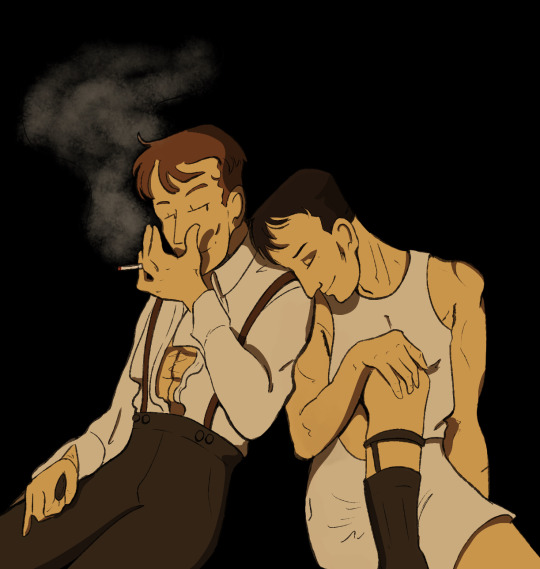
Ok so I may have gotten into a musical
And of course it’s the one about 1920′s rich boys doing bad stuff
(Basically gay Heathers)
It’s based on irl events but fictionalises it quite well, starring two boys who were convinced that they were _Ubermensch_ and therefore could get away with crime. They ended up botching a murder in hilariously inept ways, and were only really saved by an impassioned speech by their lawyer about how ‘Sure they killed a person, but who here didn’t do the same in WWI?’
29 notes
·
View notes
Text
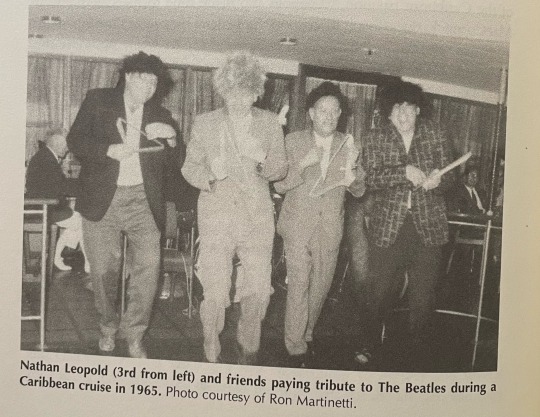
“Lennon had attitude, and, taking his lead from Lennon, McCartney could be similar. At times, they reminded me of those well-to-do Chicago lads Leopold and Loeb, who killed someone because they felt superior to him. Lennon and McCartney were ‘superior human beings’.”
it all comes full circle
- photo comes from Arrested Adolescence by Erik Rebain. Quote from Bob Wooler, Tune In by Mark Lewisohn
#great photo#thank you erik#the beatles#john lennon#george harrison#paul mccartney#nathan leopold#leopold and loeb
32 notes
·
View notes
Text
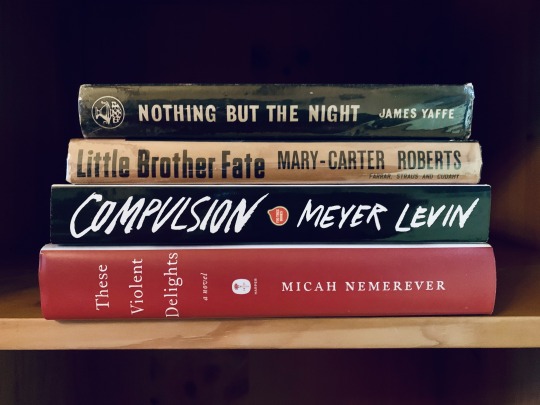
Book mood. These novels were inspired by the 1924 Leopold and Loeb case.
From bottom to top, they are These Violent Delights by Micah Nemerever (2020), Compulsion by Meyer Levin (1956), Little Brother Fate by Mary-Carter Roberts (1957), and Nothing but the Night by James Yaffe (1957).
5 notes
·
View notes
Text

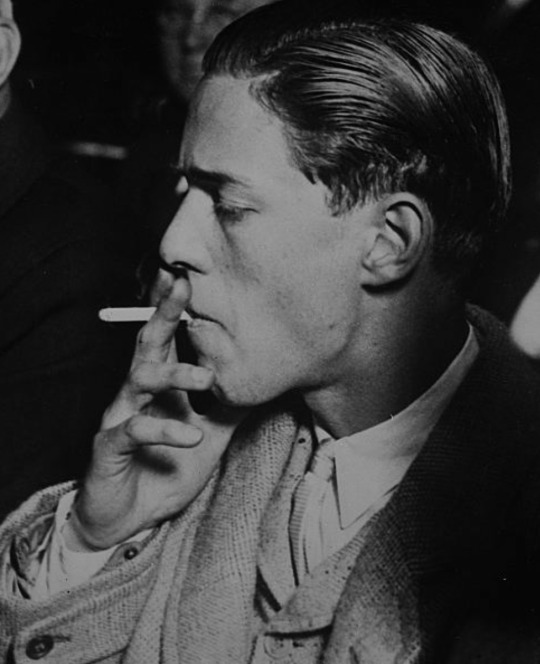
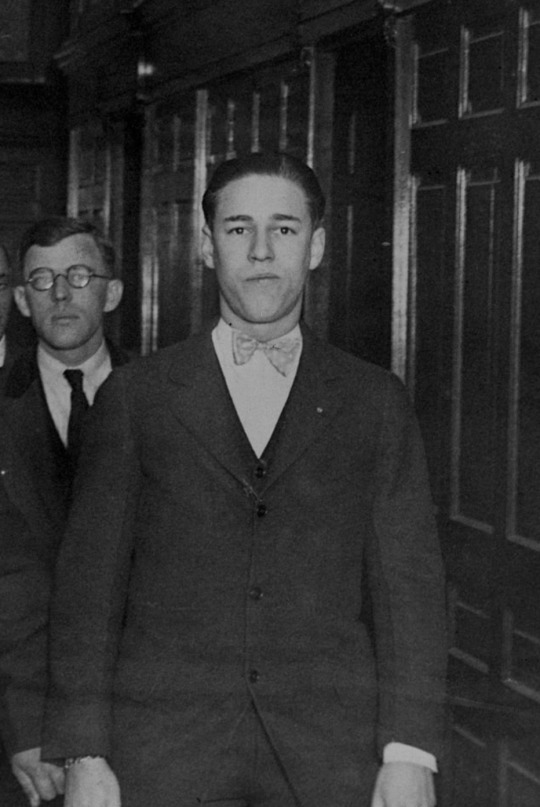
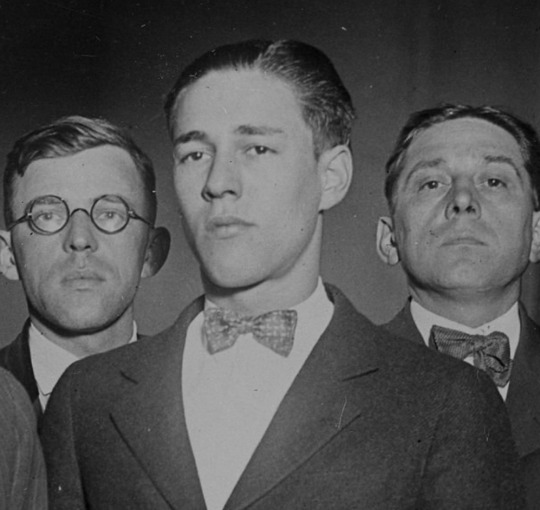
#Richard Loeb#leopold and loeb#1924#he was a pos but dammit he was hot#why was he so hot?#black and white photography#99 years ago
12 notes
·
View notes
Photo
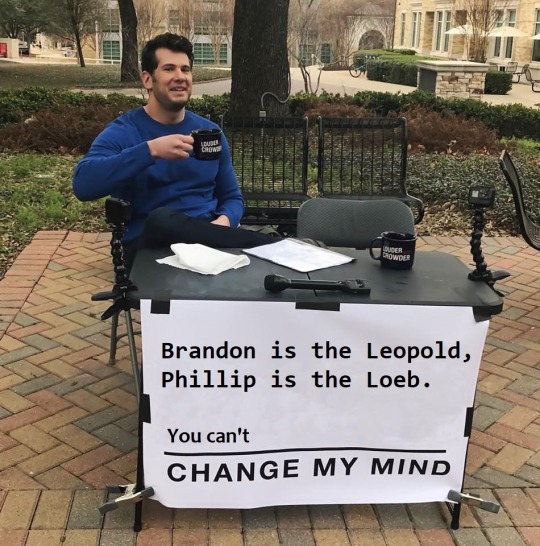
It’s obvious. Or they’re both a mix of the two.
#leopold and loeb#nathan leopold#richard loeb#brandon shaw#phillip morgan#philip x brandon#rope 1948#commentary#memes#homemade memes#txt
23 notes
·
View notes
Text
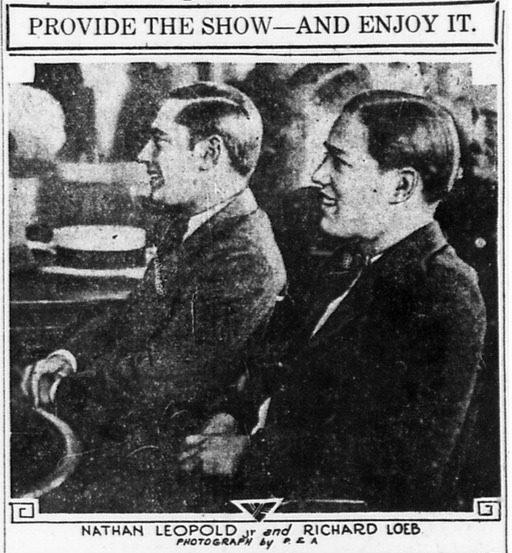

25 notes
·
View notes
Text
I have spent 8 hours since last night reading the evals and statements and newspapers from the time about Leopold and Loeb.
3 notes
·
View notes
Text
man I'm starting to get so weirdly obsessed with Leopold & Loeb story to the point when I'm already collecting movies plays and documentaries in my watchlist
14 notes
·
View notes
Note
Hi! I've been getting interested in the Leopold and Loeb case and I've read some articles that talk about that Leopold might have killed Loeb! And that they both might have killed some other people also, like a taxi driver. Do you know about that? Is there evidence? That's messed up
Yay for others interested in the most fascinating/fucked up true crime!
For both questions, I really would say the answer is no, based on the evidence we have. The first is some sensationalist bullshit designed to sell a new book based on a case already well-documented. The second is something from the time of the trial, but it does not fit their MO of being fucking cowards.
I really recommend reading Hal Higdon’s “The Crime of the Century.” It’s really the best book on the case.
4 notes
·
View notes
Text
Lerner and Lowe could have killed someone and got away with it, but Leopold and Loeb could have never written a string of smash hit musicals on broadway
11 notes
·
View notes